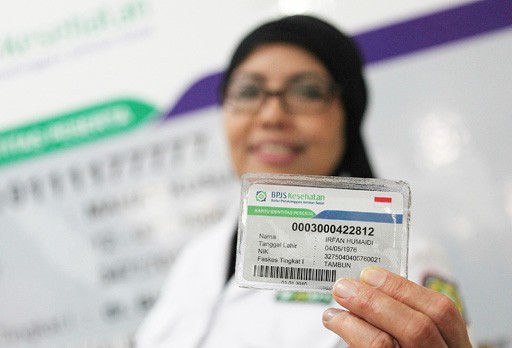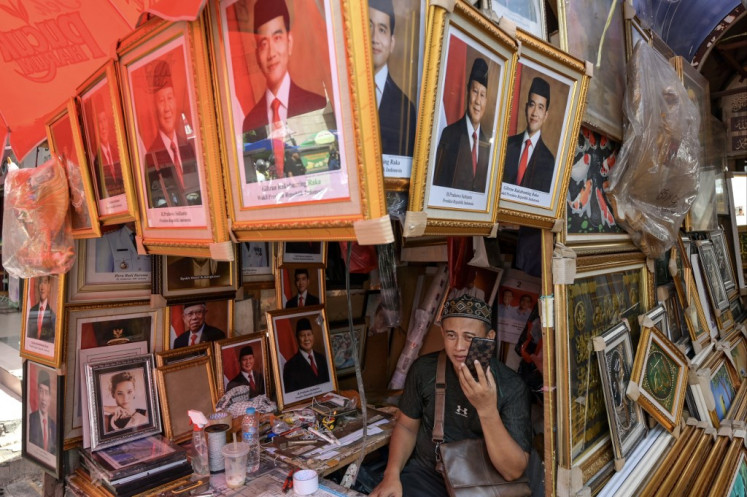Health care and well-being in 71-year Indonesia
At the national level, challenges revolving around human development are more complex than ever. Indonesia is the fourth-most populated country in the world, with roughly 254 million people and more than 17,000 islands.
It is clear that distribution of goods and services is almost impossible to be done equally.
Even after 71 years of independence, challenges in provision of health care remain mostly unchanged.
Change Size
 Healthcare card: Health insurance firm PT Askes’ director Sri Endang Tidarwati shows a health insurance card in Jakarta, in this file photo. The BPJS Kesehatan (Healthcare and Social Security Agency) scheme became effective on Jan. 1, 2014 (JP/-)
Healthcare card: Health insurance firm PT Askes’ director Sri Endang Tidarwati shows a health insurance card in Jakarta, in this file photo. The BPJS Kesehatan (Healthcare and Social Security Agency) scheme became effective on Jan. 1, 2014 (JP/-)
“Give me 10 young people and I will shake the world” is among founding president Sukarno’s famous quotes.
As we celebrate this nation’s 71st year of independence, we should reflect on multifaceted challenges of human development, from health and well-being perspectives.
Today, we can measure how the world views human development by looking at the Sustainable Development Goals (SDGs). Compared to its predecessor, the Millennium Development Goals (MDGs), the SDGs leap not only in sophistication in crafting the interlinkages between goals but also within each goal.
Take health as an example: its reach is not limited to the health goal itself but also to at least four other goals: poverty, food, gender and water and sanitation.
At the national level, challenges revolving around human development are more complex than ever. Indonesia is the fourth-most populated country in the world, with roughly 254 million people and more than 17,000 islands.
It is clear that distribution of goods and services is almost impossible to be done equally.
Even after 71 years of independence, challenges in provision of health care remain mostly unchanged. Lack of transportation, infrastructure, energy and isolation are the most common barriers to health sector development and services in villages, especially those on the borders — at Indonesia’s gateways.
In densely populated cities and semi-urban dwellings, perhaps there is more access. However, quality and affordability presents quite a substantial issue. Solving the challenges requires the government to set its sight not only within the health sector, but innovatively, also in sectors beyond health.
Compared to other developing countries, Indonesia has not fully met the standards of people’s well-being. About a quarter of the population is still left behind, compared to the 19 percent across Asia, a global report found. This is mostly caused by the widening inequality throughout the country.
Goods and services are not equally distributed between urban and rural areas due to poor transportation, insufficient infrastructure and information illiteracy.
As the first responders to community health and well-being, primary healthcare bears an enormous responsibility for solving health issues in parallel with maintaining and increasing health status of the community. In the new era, universal health coverage under the national health insurance (JKN) program has to be readily available for all, regardless of geography.
Be it in the mountains of Papua or in the big cities like Jakarta, Surabaya and Medan; primary healthcare is called to transform itself into an affordable, high-quality service.
For this transformation to happen, it calls for commitment from the government to side with the people and at the same time, to build public awareness on maintaining healthy lifestyles.
Against this backdrop of challenges and complexities, in May 2015 the Health Ministry launched the Nusantara Sehat (Healthy Archipelago) campaign, which deploys teams of health workers to peripheral areas in Indonesia that desperately need a nudge to transform not only their primary healthcare services but also their overall well-being.
Entering its fourth batch and making way to its 250th team by end of 2016, Nusantara Sehat has proven there is still hope in improving the country’s well-being through quality primary healthcare services.
Since the program was launched, 855 youth; early-career health professionals are on site, ensuring well-being is shared equally between roughly 2.5 million people.
These young people are not just health professionals but they are agents of change. Through its actions and innovations, Nusantara Sehat has showcased how health sector development can be an effective entry point to implementing sustainable development principles at the local level.
Despite the challenges, in hard to reach places such as the borders of Long Pahangai in West Kalimantan, Boven Digoel in Papua and Belu in East Nusa Tenggara, its innovations in community empowerment programs have helped reduce open defecation and child malnutrition, and helped build reproductive health awareness among teenagers.
Its presence in each of the communities embodies the optimistic spirit of independence and the visionary objective of the SDGs.
Such initiative shows that the youth are in a strategic position to push for transformation, beyond claiming demographic dividend. The key is empowering them to start taking action, engaging themselves in various fronts of development: health, education, energy, economy and others.
This way, the transformation is beyond sectoral: it is about transforming citizenship — from passive recipients of government services to concerned and engaged citizens.
Indeed, Indonesian youth are moving to realize Sukarno’s vision.
***
Rayssa A. Putri, a student at Global Jaya School, Bintaro, South Tangerang, Banten, is a student volunteer with Nusantara Sehat campaign. Diah S. Saminarsih is special adviser to the health minister on partnerships and Sustainable Development Goals(SDGs), and founder of the Center of Indonesia Strategic Development Initiatives (CISDI).
---------------
We are looking for information, opinions, and in-depth analysis from experts or scholars in a variety of fields. We choose articles based on facts or opinions about general news, as well as quality analysis and commentary about Indonesia or international events. Send your piece to community@jakpost.com. For more information click here.









